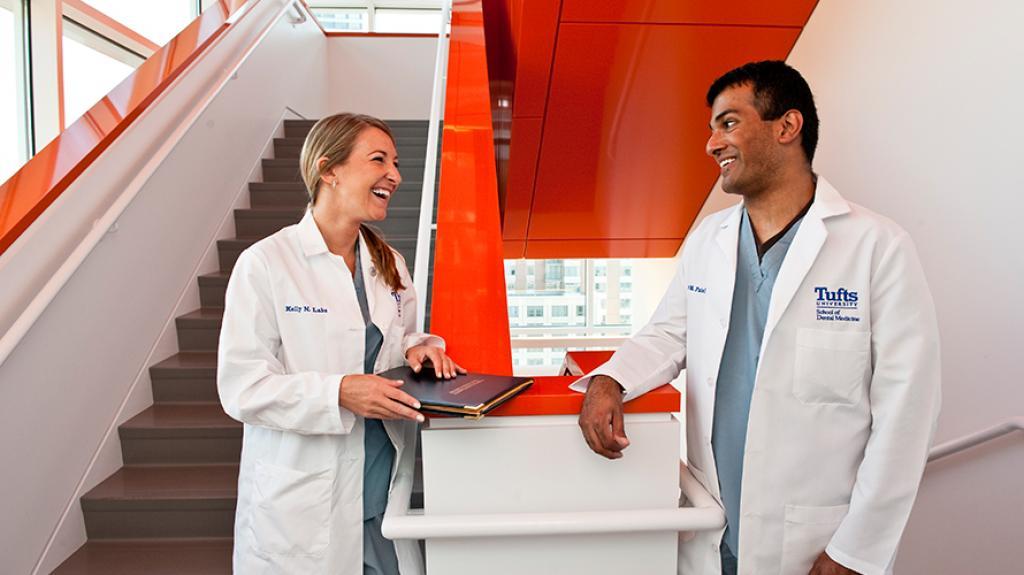Advanced Education in Orofacial Pain

All combined, our faculty with extensive experience in orofacial pain, leading one of the nation’s busiest orofacial pain clinics, and offering a stimulating multidisciplinary academic environment make TUSDM’s Advanced Graduate Program in Orofacial Pain a sought-after program nationally.
This program prepares dentists in the assessment and management of complex orofacial pain patients through a multidisciplinary approach. With hundreds of new patients every year, and two years to follow up cases, this program provides residents with a unique clinical experience, combined with immersive academic training. The program is accredited by CODA (Commission on Dental Accreditation) and prepares residents to become eligible to challenge the American Board of Orofacial Pain examination. The program aligns with the guidelines of the American Academy of Orofacial Pain.
Residents spend more than 50% of their time in the clinical care of complex orofacial pain patients. The additional time is balanced between academic courses, teaching, academic presentations, rotations in other related fields, and research activities.
Clinical care of patients occurs in the Division of Craniofacial Pain, Department of Diagnostic Sciences. The residents provide patient care under supervision of faculty orofacial pain specialists (some with additional expertise in dental sleep medicine) or clinical psychologists. The program offers a true interdisciplinary environment with many dental specialty clinics on site. The city of Boston offers referral and collaboration opportunities with experts from all medical fields.
Residents, supervised by attending faculty, will assess and manage patients with complex temporomandibular joint disorders, musculoskeletal disorders of the face, head, and neck region, primary headache disorders, neuropathic trigeminal pain, and other rare conditions causing pain and dysfunction in the orofacial region. The most complex patients are frequently assessed and managed with a team approach.
Residents are required to complete core courses in biostatistics, epidemiology, research methodology, head and neck anatomy, oral medicine, oral pathology and pharmacology. The Division of Craniofacial Pain offers additional courses in neuroanatomy and neurophysiology of orofacial pain, physical medicine, dental sleep medicine, pain assessment, and management.
As part of the training, residents will present literature reviews, clinical case presentations, and will be involved in clinical case discussions supervised by faculty. They will be involved in clinical teaching activities to undergraduate and postgraduate dental students. Additional academic activities include attending lectures at the weekly interdisciplinary Pain and Headache Rounds and the quarterly Case Series in Orofacial Pain and Headaches.
During the two years, residents will rotate in other departments of the Dental School and Tufts Medical Center. Residents are required to present posters at academic conferences in the field and they will have additional exposure to research activities based on their interests.
Program Goals and Objectives
1. Prepare residents to be competent with advanced knowledge in the Orofacial Pain field that constitutes the practice of Orofacial Pain, including the basic mechanisms and the anatomic, physiologic, neurologic, vascular, behavioral, and psychosocial aspects of orofacial pain.
2. Provide residents with multidisciplinary clinical experience to become proficient at delivering oral health care by applying current evidence-based standards in orofacial pain to interprofessional clinical practice with quality improvements that are responsive to a dynamic healthcare environment.
3. Provide the interprofessional skills to be proficient at functioning effectively and efficiently in multiple healthcare environments and within interdisciplinary healthcare teams.
4. Provide the didactic and practical skills to apply scientific principles to learning pain management and to become proficient at evidence-based clinical decision-making/disseminating information and competent to conduct clinically-related research.
5. Prepare residents to teach orofacial pain in predoctoral clinical settings, to participate in presenting in continuing education programs, and to disseminate current pain knowledge to other professions.
6. Utilize the values of professional ethics, lifelong learning, patient-centered care, adaptability, and acceptance of cultural diversity in professional practice.
Masters of Science (Additional Year)
We also offer an optional third year leading to the Master of Science Degree from Tufts University.
This has didactic and research requirements in addition to the clinical part. The didactic section of the degree requires that the resident completes 18 credit hours of courses toward the MS degree, taken in association with Masters candidates from other dental specialties. Some of these courses may be completed in the first two years (Certificate). The resident is also required to construct an original research proposal as part of his/her preparation for the research and thesis. This is essential for the completion of the MS requirements.
Research may be in a clinical or basic area relating to temporomandibular disorders and orofacial pain. including gross anatomy, histology, dental occlusion, neurology, psychology, muscle function, pain control, to name a few. Upon successful completion of the MS program, a resident should be qualified to participate in the clinical aspects of temporomandibular disorders and orofacial pain management, pursue an academic position, and conduct independent research.
The resident will also learn how to run a multidisciplinary pain practice or program and how to interact with the various health professionals. Residents will have the opportunity to follow-up their patients throughout the three years.